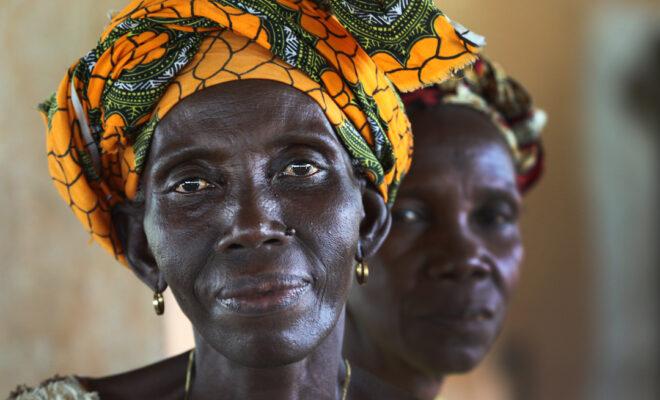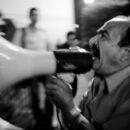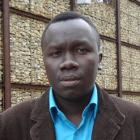Sierra Leone declared a state of emergency over sexual violence

Did it help?

A state of emergency focused attention on sexual and gender-based violence in Sierra Leone, but there is still much to do. Credit: Steve Evans
In February 2019, President Julius Maada Bio declared a State of Emergency over sexual and gender-based violence. He did this amid rising pressure over the issue in Sierra Leone.
In 2018, a series of high-profile cases had emerged including that of a five-year-old girl whose severe assault left her paralysed from the waist down. Gender-based campaigns – such as Asmaa James’ Black Tuesday and the First Lady’s Hands off Our Girls movements – became more vocal. And new figures in early-2019 showed that the number of sexual assault cases reported to the police in 2018 had more than doubled to 8,500, a third of whom were of young girls.
Claiming there was no time to spare, President Maada Bio’s declaration allowed the government to introduce new regulations immediately without consulting parliament. These included new provisions for victims and more severe punishments for offenders.
While these measures were widely applied, however, there was uncertainty about the legality of using emergency procedures to effect deep legislative changes. Amidst this lack of certainty, the government quietly revoked the State of Emergency in June and introduced a full-blown legislative programme through parliament, which passed the amendments in September.
Did the state of emergency work?
In Sierra Leone, opinions on the value of President Maada Bio’s short-lived State of Emergency vary. Some suggest the president received bad legal advice in declaring it and point out that regulations passed during national emergencies are only temporary. This fact has raised questions about convictions that were handed down in the February-June period and has left some offenders in limbo.
By contrast, other advocates commend the declaration for re-focusing much-needed attention on sexual violence and fast-tracking cases in the courts. One NGO worker said the move also helped the organisation successfully re-bid for donor funding, which had started to “dry up” for such gender-based programmes. Some others suggest the emergency furthered the conversation in Sierra Leone and say that it did eventually lead to a new law.
This new law was the result of amending the 2012 Sexual Offences Act. Many activists regard the original act as a “robust piece of legislation” but with shortcomings. They say it covered a wide range of crimes and expanded the meaning and scope of sexual offences but failed to address challenges related to issues such as case processing prior to prosecution, investigations, court case management, and sentencing. The 2012 act also failed to provide a minimum sentence for sexual offences against children resulting in some outrageously lenient sentences.
The 2019 amendments address some of these criticisms. Among other things, the new legislation increases the minimum sentence for rape from five to fifteen years for adults (with a maximum of life imprisonment) and can potentially allow cases to go directly to the high court without the need for a preliminary investigation at the magistrate court. It includes provisions for new offences such as solicitation by persons in authority (e.g. teachers, religious figures, doctors) and aggravated sexual assault.
The new law also criminalises “compromise”, which means that if anyone (be it a family head, religious leader, chief etc.) attempts to settle a case of sexual violence in their community instead of reporting it to the police, they can be fined 10 million Leones ($1,000) and/or spend 1-10 years in prison.
The challenges ahead
Sierra Leone’s new laws have generally been greeted as positive, but they also have their own weaknesses. For instance, the chief justice has yet to provide specific sentencing guidelines, while the Rules of Court Committee is still to provide rules and procedures for the implementation of the amendment. Provisions for a sex offender register don’t include details as to how it will work, and while victims are supposed to be able to access free medical care in relation to their assault, there are no guidelines around this. Furthermore, Sierra Leone’s correctional centres are already overcrowded and this may get worse with longer sentences.
Perhaps the most controversial change is that people below the age of 14 can now be prosecuted for sexual offences. There is also some criticism that recent attention has focused disproportionately on sexual violence, particularly of young girls, and neglected other types of gender-based violence.
For all the pros and cons of the new legislation, broader structural issues will also need to be addressed if the state really intends to tackle sexual and gender-based violence. Firstly, and perhaps most importantly, it is the case that the vast majority of Sierra Leoneans do not engage in the state-sanctioned legal system. Police stations are often very far from where people live and it costs time and money to go and report such issues. Police facilities are poorly staffed and underfunded, especially outside big cities.
More severe sentences could in fact lead to a reduction in victims reporting crimes. Some people are already deterred from informing formal authorities about violations because such incidents can cause significant ruptures in small, tight-knit communities. Harsher sentences could lead to people being more deterred.
Finally, the criminalisation of compromise could have implications for local power structures and community leaders, who can be penalised for intervening. Many people in rural areas commonly resolve cases using informal channels and criminalising compromise may drive a further wedge between the formal legal system and traditional authorities. However, whether community members will actually feel comfortable reporting these infringements is another matter.
While President Maada Bio’s State of Emergency has had a mixed reaction, there is no denying that it did create momentum that ultimately led to substantial legal changes that should better protect women and girls. As ever, however, the remaining challenge is to ensure it is implemented and enforced, and that Sierra Leoneans have access to, and faith in, the social and criminal justice services that exist to uphold these laws.






well, it is the best thing to do, gender based violence and sexual harassment are “state emergencies” and must be treated as such…
plus to you Mr President..
Sexual harassment is a state emergency
Which needs to be cute off in Sierra Leone, why the first lady in Sierra Leone should take her hands off it. Those it makes any sense? grade based camping, Honestly our ministers and our president in Sierra Leone are so much care less about the youths in Sierra Leone. They are just there to put down the Sierra Leone government. While other ministers are trying to boost up their own country. Am Furious with the fake elders in Sierra Leone.
chloroquinolone malaria https://chloroquineorigin.com/# hydroxychloroquine dangers
https://cialiswithdapoxetine.com/ cialis without a doctor prescription